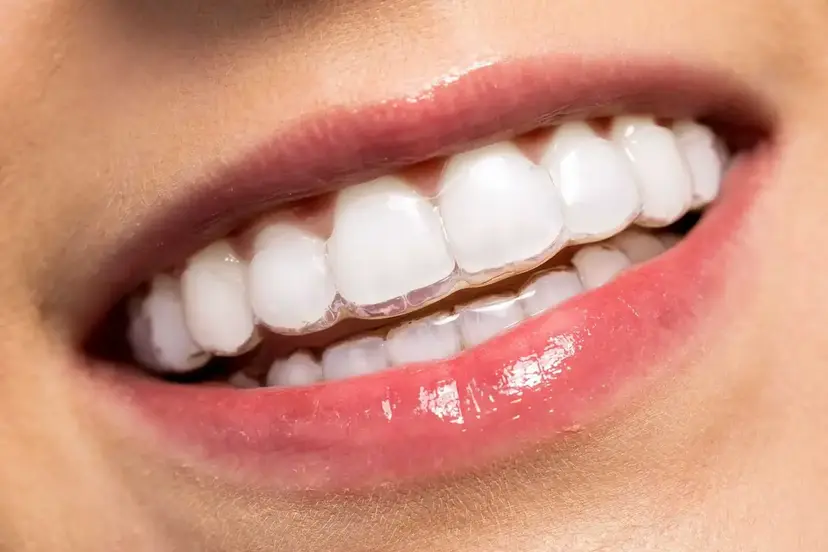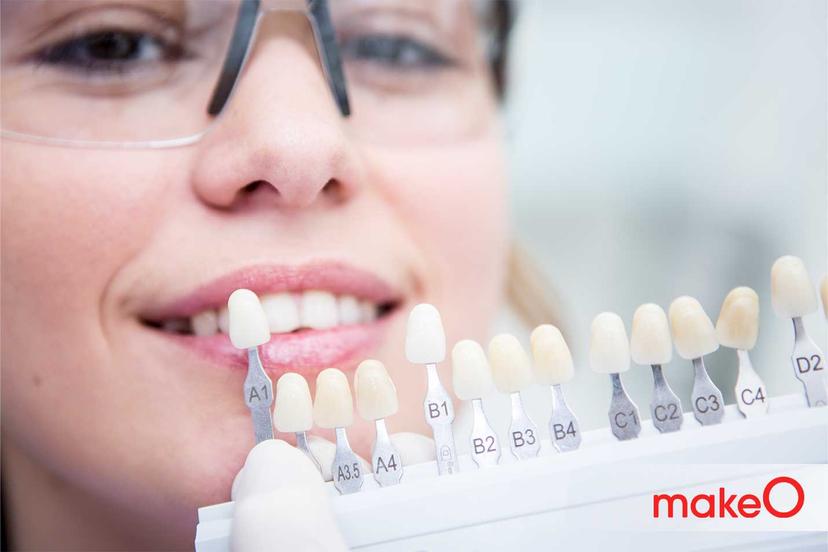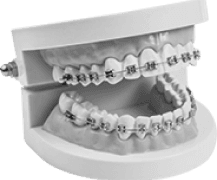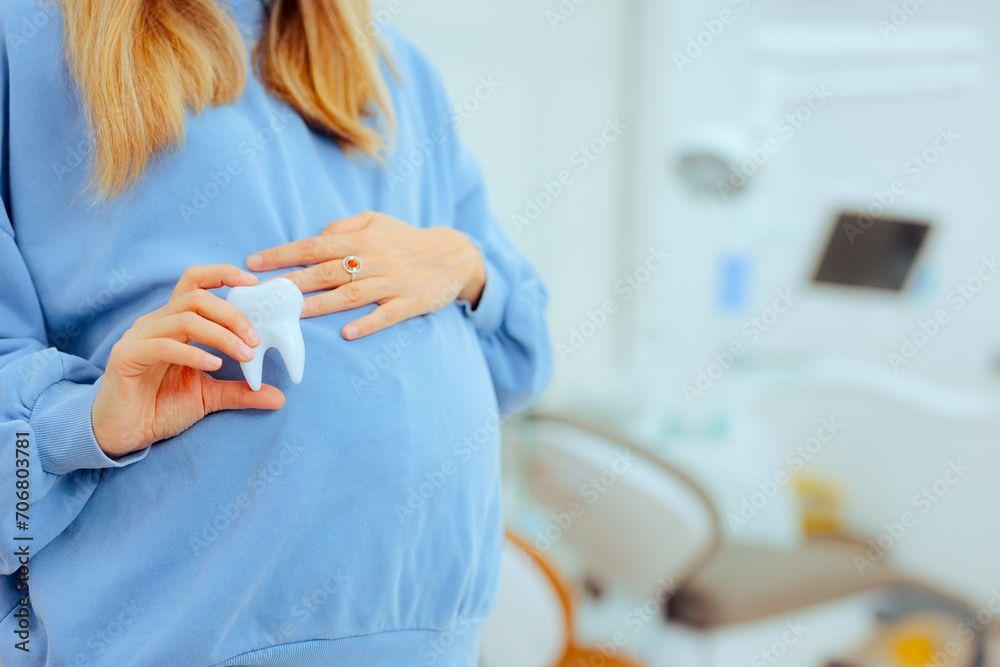MakeO blog
Over time, factors such as ageing, dietary choices like consuming coffee, tea, and red wine, smoking, and poor oral hygiene can contribute to tooth discoloration. Moreover, hormonal fluctuations during pregnancy can further affect the colour of your teeth, making it a common concern for expectant mothers. Typically, teeth whitening treatments are done to enhance your tooth colour. However, these include the use of chemicals like bleaching agents, the safety of which may be a matter of concern during pregnancy. Many dentists recommend avoiding teeth whitening during pregnancy as these ingredients may not be safe during pregnancy. In this blog, we will explore the recommendations on use of different teeth whitening methods during pregnancy and other alternatives for teeth whitening that you can consider if you’re pregnant.
Safety Concerns of Teeth Whitening in Pregnancy
The options available for teeth whitening include professional treatments from experts at a dental office and teeth whitening kits or natural remedies for home use. Tooth whitening costs in India can vary significantly depending on the method chosen and further based on factors like the brand used, clinic's location etc. However, the safety of these whitening options during pregnancy is still a debatable topic of discussion among dental professionals.
It is important to remember that teeth whitening during pregnancy raises some important health concerns. These include:
Chemical exposure: As many whitening agents contain hydrogen peroxide or carbamide peroxide as the main ingredient, it is generally considered unsafe as it can be absorbed into the bloodstream. The effects of these chemicals on a developing foetus are not well-studied.
Gum disease: Pregnancy can increase the chances of gum irritation and sensitivity due to hormonal changes. Whitening treatments may exacerbate these issues, causing discomfort or damage to the gums.
Tooth erosion: Whitening products contribute to erosion of teeth and sensitivity that pregnant women are already prone to due to increased acidity of saliva.
Nausea: Pregnant individuals often experience heightened nausea, which may be triggered by the taste or smell of whitening products.
Should You Consider Teeth Whitening During Pregnancy?
The guidelines on safety of teeth whitening options during pregnancy is still a debatable topic of discussion among dental professionals. There is limited research on the use of these in pregnancy. But in general, following are the recommendations when it comes to the different teeth whitening methods:
Professional teeth whitening treatments: Generally, most dental experts advise against professional whitening treatments for women who are pregnant, especially during the first trimester.
At-Home whitening kits: Similar to professional teeth whitening treatments, there is limited research on the use of at-home whitening kits during pregnancy as they consist of bleaching powders as an active ingredient. Hence, it's best to avoid them.
Natural At-Home Whitening Products: While some non-bleach whitening options such as fruit peels or juices are generally regarded as safe, their effectiveness is often questioned. Also, their overuse should be avoided. It's best to discuss with your healthcare provider before using any home remedy for teeth whitening during pregnancy.
To sum up, most dental professionals suggest waiting until after pregnancy to have elective dental treatments, like teeth whitening as there is limited research on whether these procedures are safe during pregnancy. If you are still worried about your aesthetics, consult your dentist for personalised advice and understand safer alternatives that may be appropriate during pregnancy.
Alternatives to Teeth Whitening During Pregnancy
Wondering how to keep your teeth looking their best during pregnancy while prioritising safety? During pregnancy, many women seek to enhance their smiles but may wonder about the safety of traditional teeth whitening methods. Fortunately, there are some alternatives to consider that can help maintain a bright smile without the use of harsh chemicals.
Practise good oral hygiene: You can maintain your oral health by regularly brushing with fluoride toothpaste, flossing, and using a mouthwash to help keep your teeth clean and minimise stains.
Avoid certain foods and drinks: Avoiding foods and beverages which stain the teeth like tea, coffee, and red wine can be beneficial. It is also recommended to limit or avoid foods and drinks like coffee and sugary sodas, especially since high caffeine intake is considered risky during pregnancy.
Natural remedies: There are also some non-bleaching methods you can try. Safe methods such as pressing chopped strawberries against your teeth, or using a toothbrush with baking soda, along with consuming saliva-boosting foods can be beneficial, though these should be used in moderation to prevent dental risks.
Dietary adjustments: Incorporating fruits and vegetables like pears, celery, carrots, and apples into your diet can aid saliva production. Staying hydrated: Drinking plenty of water can help wash away food particles and keep your mouth clean.
By exploring these alternatives, you can keep your smile bright while ensuring the health and safety of both you and your baby.
Conclusion
Teeth whitening during pregnancy may be associated with some safety concerns such as harm to the foetus due to chemical exposure. While there is a lack of studies on the safety of use of whitening methods during pregnancy, oral health experts usually recommend delaying elective dental procedures, such as teeth whitening, until after pregnancy.
During pregnancy, it’s wise to rather focus on maintaining excellent oral hygiene and regular dental check-ups, while opting for teeth whitening procedures after pregnancy. If you’re still worried about how your teeth look during pregnancy and want safer options, it is best to discuss with your dentist to design a personalised treatment plan.
FAQ’s
1. Is teeth whitening safe during pregnancy?
Teeth whitening is generally not recommended by professionals during pregnancy due to potential risks to the developing foetus. If you are highly concerned about your aesthetics, it is best to consult with a healthcare professional before considering any whitening treatments during your pregnancy.
2. Which natural tooth whitening methods are considered safe in pregnancy?
Natural tooth whitening methods using non bleach ingredients such as brushing with baking soda, fruit peels and juices or activated charcoal, and rinsing with apple cider vinegar can be used in pregnancy. Nevertheless, it’s crucial to use these techniques in moderation to prevent damage to your teeth. Moreover, eating crunchy fruits and vegetables, such as apples and carrots, can assist in removing surface stains.
3. What are the potential risks of teeth whitening during pregnancy?
Tooth whitening during pregnancy may pose risks due to potential exposure to chemicals, which could affect foetal development. Hormonal fluctuations can heighten gum sensitivity, making irritation more likely. Hence, for safety reasons, it is typically recommended to postpone whitening treatments until after pregnancy.
4. Can I have my teeth whitened while I’m breastfeeding?
It's generally considered safe to whiten your teeth while breastfeeding. However, it’s best to consult with your dentist before proceeding. They can recommend options that are safe for both you and your baby. Additionally, some whitening products may be more suitable than others, so discussing your specific situation with a dental professional is always a good idea.
Related articles

Types of Braces: Removable vs Fixed Braces, Which is Right For You?

This Diwali, Smile Bright With makeO Teeth Whitening Kit

Dr. Pravin Shetty: Pioneer in Lingual Orthodontics & Innovative Smile Solutions
How do I Know I’m the Right Candidate for makeO toothsi Teeth Aligners?

